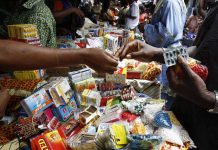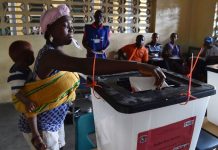It is dicey for government at any level to begin the New Year with a curfew – ostensibly to tackle an epidemic. This is the position that the Southern African country of Zambia has found itself. The authorities have announced a seven-day curfew, declaring that the vaccination of children has already started in the bid to check the high number of cholera deaths in Kanyama township.
Meanwhile, the government said it recorded 90 new cholera cases compared to the 154 cases reported last week.
Health Minister, Chitalu Chilufya, announced at a news briefing in Lusaka that the vaccination exercise which started last Wednesday would first be administered in cholera epicenters, Chipata and Kanyama townships.
Dr. Chilufya ordered the traders who had been illegally selling food in Chinika area, to stop the act at once to enable Defence and Health officers fumigate the area at night to quell the disease which had affected normal life and the flow of business in Lusaka. Kanyama had more than 200 shallow wells which were earmarked for burial as 30 per cent of the facilities were found to be contaminated while 800 area pit latrines would be disinfected.
According to the Health Minister, new cholera cases have dropped from 154 reported last week to 90 cases and this comprised 35 children and 55 adults while three people were brought in dead in Kanyama, Chelstone and Chipata townships.
The minister urged Lusaka residents in particular to ensure they observed good hygiene because behavioral change was important in combating cholera while some food outlets that met hygienic conditions had been opened.
Dr. Chilufya also described as rumours the impression that Lusaka would be in a lock-down to allow Government officials to conduct aerial spray as a measure to contain the cholera epidemic.
His Water and Sanitation counterpart, Lloyd Kazhiya, refuted claims that Lusaka Water and Sewerage Company (LWSC) was supplying contaminated water, stating the water utility firm was transporting 50,000 liters of fresh water to Lusaka.

















